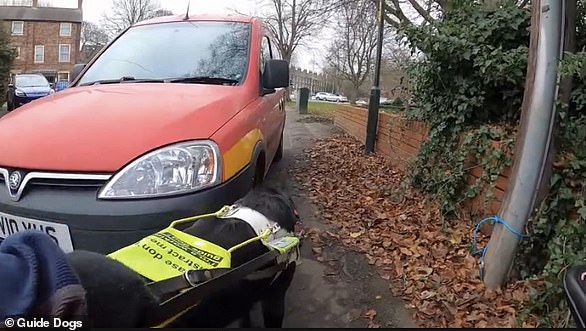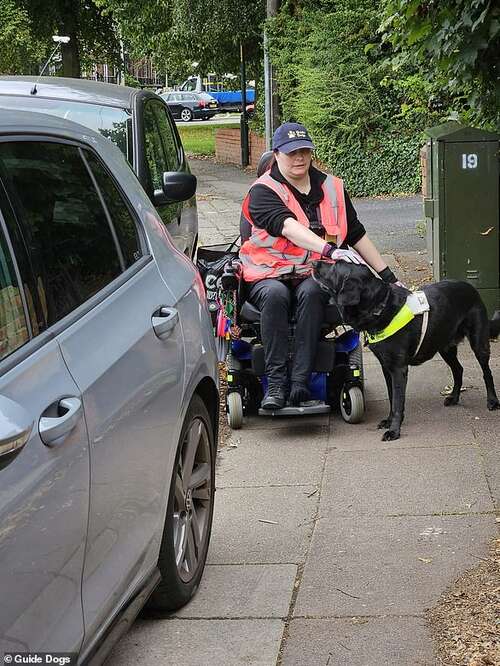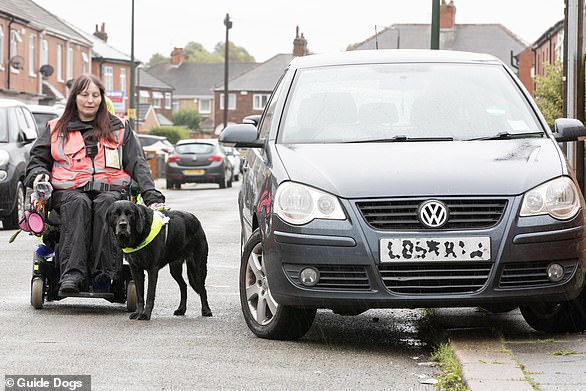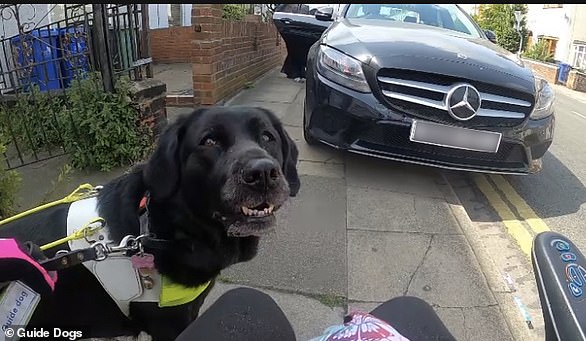Seven in ten MailOnline and This is Money readers back calls for a ban on pavement parking across England, a poll suggests.
The Local Government Association (LGA) this weekend said councils should be given powers to fine drivers who block footpaths, describing motorists who park on the pavement as a ‘scourge’ on wheelchair users, the blind and parents with pushchairs.
And the majority of our readers agree; our poll on pavement parking received more than 3,000 responses and found that 69 per cent want the Government to outlaw it across the country.
Julie Pilsworth, 45, from Grimsby, is registered blind and uses a mobility chair. She has given her account of the difficulties she and guide dog, Maeve, face on a daily basis when encountering vehicles blocking the footpath, including some of the angry reactions from owners when asked if they can move to allow her to pass (read her story below).
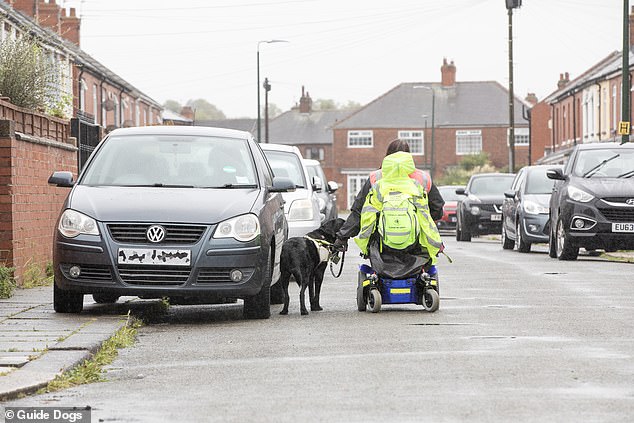
Seven in ten MailOnline readers have called for pavement parking following calls from councils and charities for the government to outlaw it across England
Some 3,036 MailOnline readers have had their say in our poll (at the time of publishing this story).
When asked if they want pavement parking banned across England, 2,090 voted in favour compared to just 945 responding no.
We surveyed reader opinion as part of our coverage of the LGA’s statement on Saturday, in which it called for the Government to provide more powers to stop motorists using footpaths as parking spaces.
Currently, pavement parking is only banned in London, but councils have been pushing for it to be extended across the whole of England to tackle the issue.
Cllr Darren Rodwell, transport spokesperson for the LGA, which represents councils in England and Wales, says it is one of the ‘biggest complaints’ it receives from the public and changes to rules is ‘now long overdue’.
He and the LGA criticised ministers for failing to take action to get to grips on the issue following a consultation into pavement parking in 2020.
More than three years on since it was wrapped up, the Department for Transport is still yet to shine any light on its findings and recommendations to address the problem.
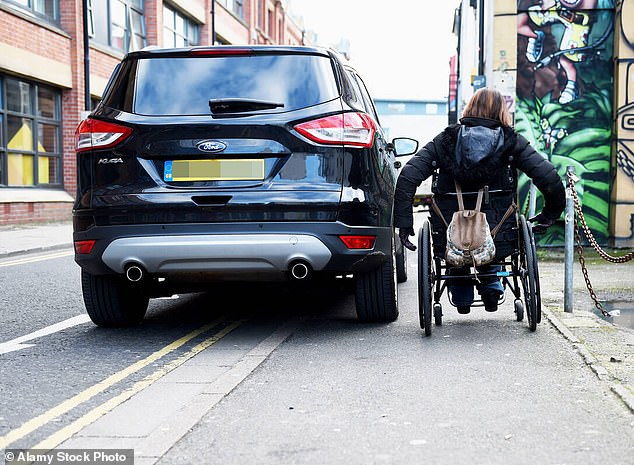
When asked if they want pavement parking banned across England, 2,090 MailOnline readers voted in favour compared to just 945 responding no.

In 2020, the DfT launched a consultation on extending the ban on pavement parking across England. However, an announcement has yet to be made regarding the findings
And it’s not just councils who are upping pressure on the Government to introduce change.
Last year, Guide Dogs launched a campaign for pavement parking to be outlawed, including a petition which currently has just under 28,000 signatures.
Research conducted on its behalf of the charity by YouGov in September found eight in 10 people (85 per cent) know that pavement parking impacts the safety of pedestrians with a vision impairment. And nearly three-quarters (72 per cent) said pavement parking is common where they live.
It also polled local councillors and found the majority (95 per cent) believe it creates a safety risk for pedestrians with a vision impairment, with 70 per cent admitting pavement parking is a problem in their areas.
Like the LGA, Guide Dogs’ campaign has called for national restrictions on pavement parking, saying a ‘clear law is needed where pavement parking is the exception, not the norm, to ensure that everyone can walk their streets safely’.

London is the only location in England where it is illegal to parking on the pavement – even if it’s just one or two wheels up the kerb. Scotland has rolled out a ban this year
Eleanor Briggs, head of policy at the charity, said: ‘The message from the public and local councillors is clear; our streets are not safe because of cars blocking pavements.
‘The Government need to act now as local councils don’t have the powers they need.
‘Parking on pavements is a nuisance for everyone, but potentially dangerous if you are a wheelchair user forced onto the road, pushing a child in a buggy or have sight loss and can’t see traffic coming towards you.’
She added: ‘This daily threat can mean people can’t safely get to work, education or to see friends.’
When motorists park partially – and sometimes fully – on the pavement, it is with often with good intentions in mind.
This is especially the case on narrow roads, with vehicles parked on both sides of the street.
By putting at least two wheels on the footpath, drivers provide more room for other motorists to pass through tight spaces, reducing the likelihood of vehicle-to-vehicle damage as well as causing traffic delays.

Often, when motorists park partially on the pavement, it is due to how narrow a road is. By putting at least two wheels on the footpath, this provides more room for other vehicles to pass through tight spaces. However, this is often to the detriment of pedestrians

The LGA says there is a secondary issue with pavement parking: as well as blocking access for vulnerable pedestrians, it can also cause damage to footways that they are then responsible to repair if they threaten to cause injury
The LGA says that pavement parking also has secondary impact resulting from heavy vehicles parking on footpaths that are not designed to take such loads.
This can cause pavements to crack and damage the surface, which in turn creates trip and injury hazards for pedestrians.
In these cases, it often results in costly repairs, which come out of councils’ ever-tightening budgets.
While in England it is only banned in London, a nationwide pavement parking ban has been introduced in Scotland this year.
Local authorities as of January 2024 can now dish out fines of £100 if they identify drivers parking on pavements and blocking the footway for pedestrians. The fine amount is reduced to £50 if paid within 14 days.
A consultation is also set to take place in Wales on introducing restrictions on pavement parking.

Transport & Environment says new cars are getting wider by 1cm every 2 years on average, and as a result they are too wide for on-street parking bays and bullying cyclists off the road
The call for pavement parking to be outlawed across England comes weeks after green transport campaigners warned that new models are getting wider on average by 1cm every two years – and many cars are now too wide for on-street parking bays.
Transport & Environment blamed the rise of ‘mega SUVs’ for taking up more of our streets, bulging out of parking spaces and ‘bullying cyclists off the road’.
This is Money contacted the Department for Transport for response to both the LGA and Guide Dogs calls for the ban on pavement parking to be extended to all councils in England.
A DfT spokesperson told us: ‘Everyone should be able to navigate their streets without obstacles, and while local authorities already have powers to prohibit pavement parking through local regulation, we have consulted on further helping them take action.
‘The response to this will be published in due course.’
The DfT added that councils do already have some powers to tackle parking on the pavement.
Through Traffic Regulation Orders using powers in the Road Traffic Regulation Act 1984 and the Greater London Council (General Powers) Act, councils can issue Penalty Charge Notices (‘parking tickets’) to offending vehicles and have the power to remove vehicles that are illegally parked, the spokesperson pointed out.

